Bishop Andriy Khimyak: Serving to reveal to people the face of God the merciful Father
October 2, 2024
“When my grandmother taught me to christen, taught me prayers at home, she prayed herself, and I saw how deeply she prayed, I understood that she was teaching me what she was,’ Bishop Andriy Khimyak, Auxiliary Bishop of the Kyiv Archeparchy and Secretary of the Synod of Bishops of the UGCC, explains what it means to evangelise with a simple example from his own life.
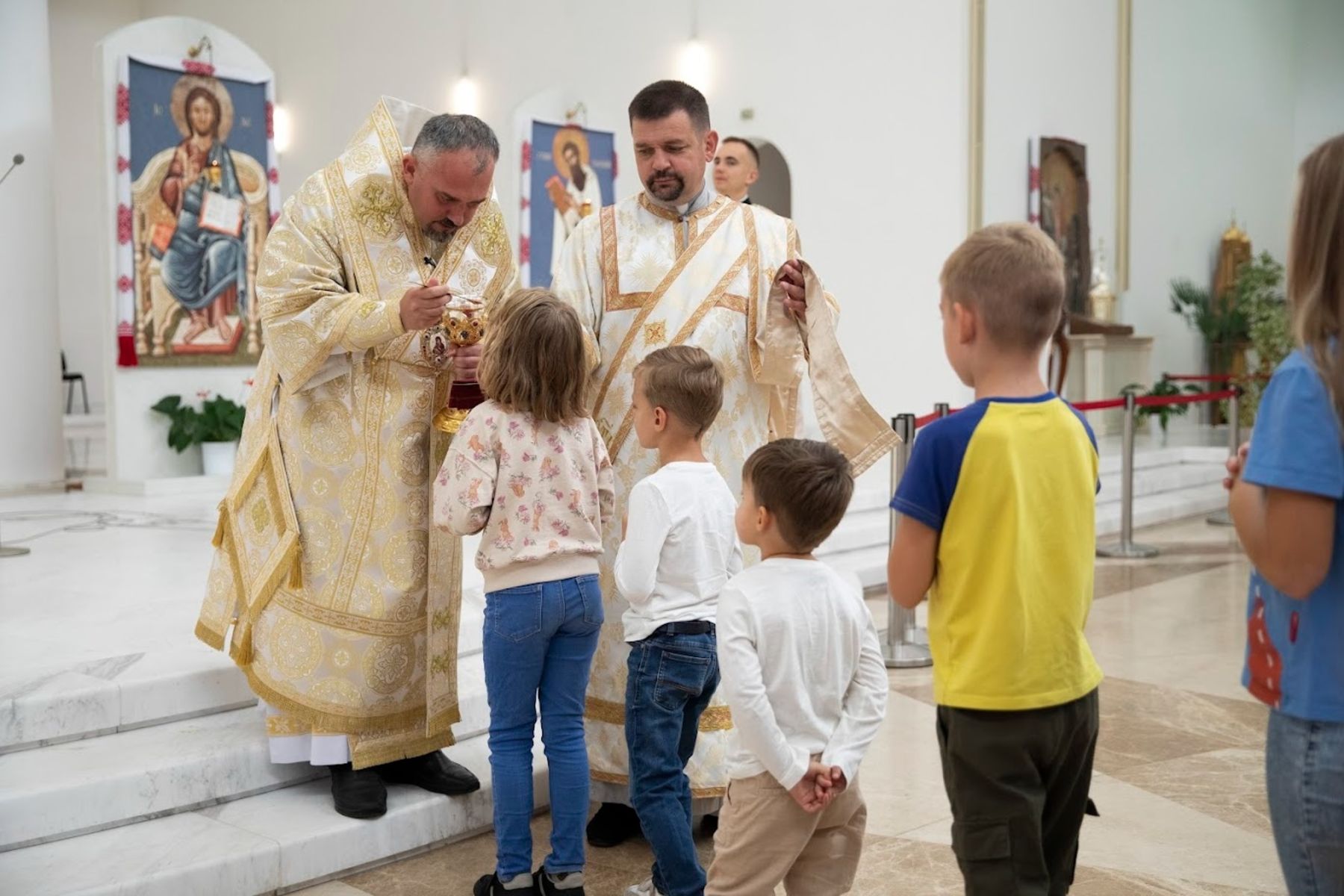
The topic of our conversation was the activities of the Kyiv Archeparchy aimed at providing comprehensive support to the residents of those areas of its territory that suffered the most as a result of the russian invasion and were occupied.
To evangelise through works of mercy
Another piece of advice from the Synod of Bishops of the UGCC, which the bishop drew attention to, is to ‘evangelise through works of mercy’. ‘This is when we reveal God to other people through good deeds, when we serve the needy and perform acts of mercy for others,’ he explains, ‘thus revealing God’s mercy to people. In times of war, it is very important for Ukrainians to see this merciful face of God, so the Church does many acts of mercy, especially in the East, North, and South of Ukraine — wherever there is the greatest need. Bishop Andriy recalled the words of one woman who received help from the Church: ‘I always knew that I needed to bring something to church, and here the church brought me something.’ ‘That is, there was a certain change in her mind,’ he explains, ‘that is, that the Church does not only ask or demand something from people, either money or donations or some other gifts. But the Church is the one that, on the contrary, serves people and brings something to people. Therefore, in this way we reveal the face of another Church — the Church of the Mother, which cares for her children who are in the greatest need.’

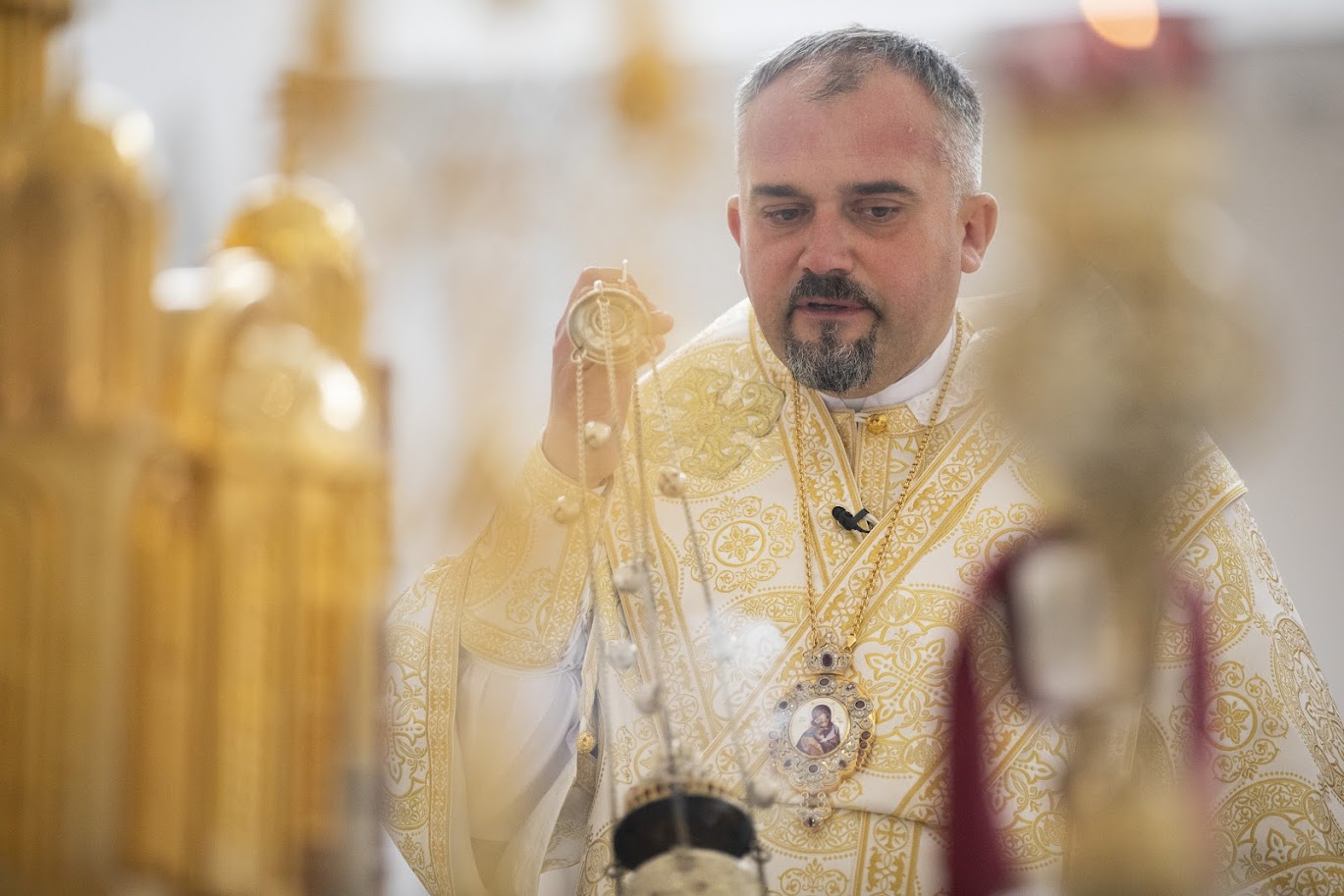
Summing up the topic of the resolutions of the Synod of the UGCC on evangelisation, the bishop noted that these decisions were not made for a limited period but should remain valid forever. ‘In a year, we will have a new Synod, a new topic, but these decisions do not become irrelevant,’ he explained. ‘Therefore, this is something that we must take into our lives, learn, and give others the knowledge of God so that others will think: ‘Why is he doing this? Others do not do this. Why do Christians or Catholics do this and that?’ Many times, I am asked this question, and I answer: ‘We do it because the Lord tells us to do it, because we cannot do otherwise.’ And accordingly, through our faith, we also kindle faith in other people. That’s what we are called to do.’
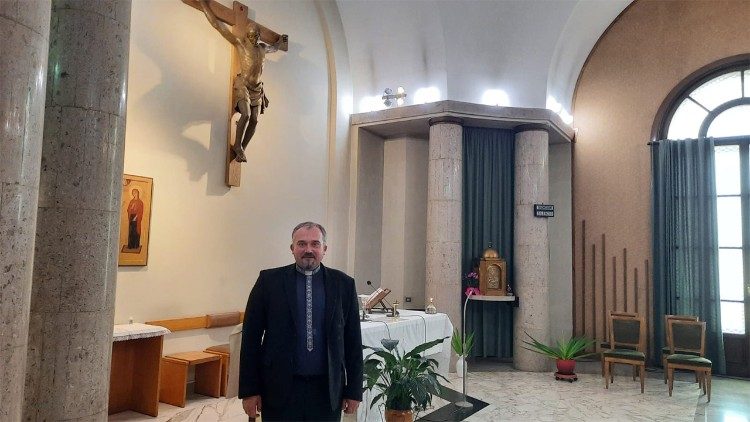
Works of mercy of the Kyiv Archeparchy during the war
Continuing the theme of evangelisation through works of mercy, the auxiliary bishop of the Kyiv Archeparchy of the UGCC spoke about some aspects of their activities in the north of the archeparchy, which suffered the most from the russian invasion and was occupied.
Despite the fact that the occupation of parts of the Kyiv and Chernihiv regions did not last long it left a deep wound in the lives of people there. ‘When we visited these villages, both those with our parishes and those without, and tried to help these people in the first months after the de-occupation, we saw many destroyed and damaged houses, we met people who had really experienced this horror of war, and probably could not recover for a long time and fully understand what had happened,’ he says.
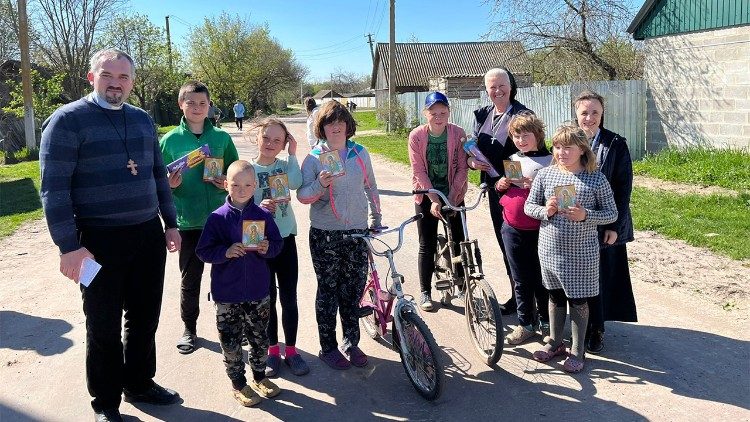
In the first months after the de-occupation, Bishop Andriy Khimyak, together with Bishop Stepan Sus, Bishop of the Curia of the Kyiv-Halych Major Archbishop, visited the de-occupied villages and brought humanitarian aid provided by Caritas and the Mudra Sprava Foundation, because at that time people there had no gas, electricity, or food. Then the Archeparchy began to help restore the houses, and Caritas set up programmes to help people with heating, firewood, etc. for the winter. Bishop Khimyak said that until now, thanks to the support of the Mudra Sprava Foundation, their Archeparchy has been delivering hot meals to villages: every day, to a different village.
The centres of invincibility, which the Kyiv Archeparchy set up with the support of the Apostolic Exarchate of the UGCC in Germany, proved to be very useful for people, especially during the first winter of the war, when there was no light, no heat, no communication. These centres, according to the bishop, are still operating.
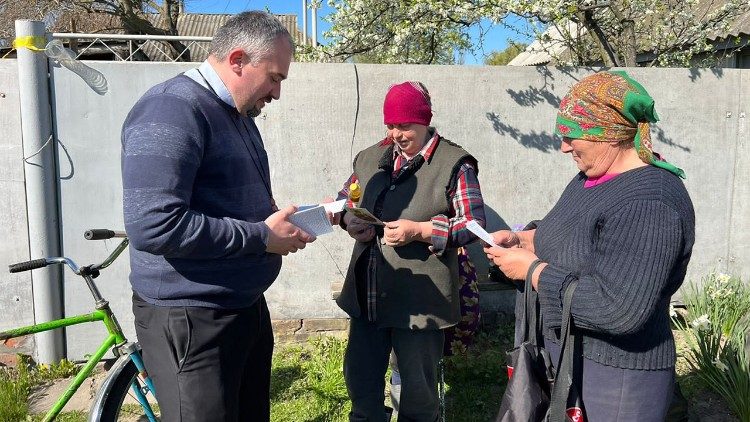
Healing the wounds of war
Bishop Andriy emphasised that at this stage of the war, an important area of assistance organised by the Kyiv Archeparchy is the creation of centres for psychological and spiritual support for people who have been traumatised by certain tragic events in their lives. ‘So, we try to help at different levels,’ he stressed, ‘both at the basic level, for example, by providing food, which we are still doing, and at the spiritual level, which is what parishes and priests do, as well as at the psychological level, in order to embrace the whole person who needs help.
Priests who survived the occupation
Bishop Andriy Khimyak also pointed to the important example of priests who remained with their faithful during the occupation. In particular, he mentioned the Greek Catholic priest who remained in Slavutych and the Redemptorist fathers who were in Chernihiv, as well as other pastors of the Donetsk, Kharkiv and Odesa exarchates, who, as the bishop stressed, did not want to leave their people, even under the threat of losing their lives. ‘These are people who choose to be with people on the front line, and to be there as long as there are people who need our presence there,’ he said. ‘Therefore, our fathers, having experienced this horror of war, in my opinion, have the experience of God’s mercy, God’s grace, and can now testify to it with renewed vigour, and serve.
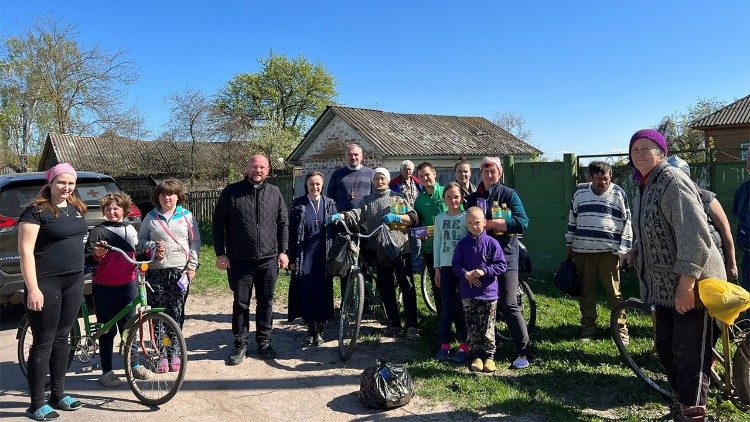
Gratitude to the parish priests who opened the doors of the church to shelter
Bishop Andriy added that people are grateful to the many priests who opened the doors of their parish premises to give people a place of refuge and shelter. In this context, he recalled the story of Father Oleh Panchyniak, pastor of the Greek Catholic parish in Brovary. Although this town was not occupied, Russian troops were very close, and the basement of the Greek Catholic church, which was built relatively recently among high-rise buildings, became a place of refuge for local residents from russian shelling. Among those who came to the church to hide from the bombing were those who had previously opposed its construction. And now they realised that they needed the church here. ‘So, many times God changes people’s hearts even through war, through such difficult circumstances,’ says the hierarch. ‘Therefore, it is important for us, as pastors, to be with people and serve, to be who we are, that is, to serve both liturgically and socially, so that people can see the face of the merciful Father.
Devoted service helps people find their roots
Bishop emphasised that through the multifaceted ministry of the Church — liturgical, social and educational — people discover the Ukrainian Greek Catholic Church. He recalled another incident from his life that took place in 2023 in the Makariv region, which also survived the occupation. While visiting these territories, the bishop had a conversation with one of the local heads of the UTC, who told him that they had discovered that there had once been a church of the Uniate Church in their village, and even found a photograph in the archives of what it looked like. ‘And they made this discovery during the war, in 2023. But, again, it happened because the local Greek Catholic priest was very active and served them with his heart and soul,’ explains the bishop, ‘and they began to wonder what the UGCC was and discovered that these were their roots. The head of the united territorial community also noted that according to historical references, in 1594–1595, Metropolitan Mykhailo Rohoza lived there, so there is an assumption that it was there, in that village, that he came up with the idea to implement the Union of Brest. That is why the local leadership is open to cooperation to open a museum of the Brest Union there. ‘That is, through this ministry, people discover who we are: that we are not some alien churches, someone who came to them and imposed something on them, but that we are the Church of Kyiv, which came to its own lands, returned to where we can be now, where we can freely preach Christ and help people.’
Press service of the Patriarchal Foundation “Mudra Sprava”